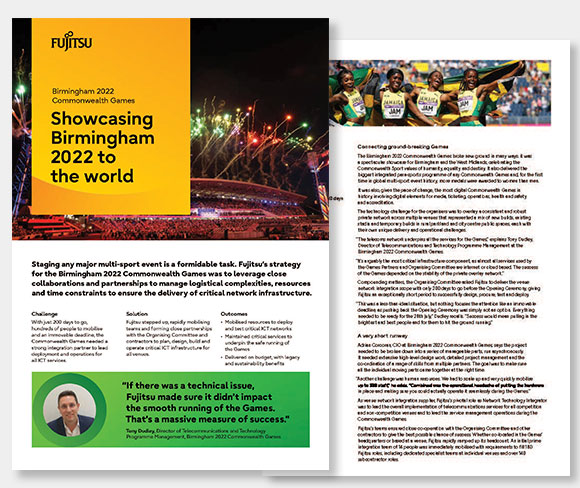Staging any major multi-sport event is a formidable task. Fujitsu’s strategy for the Birmingham 2022 Commonwealth Games was to leverage close collaborations and partnerships to manage logistical complexities, resources and time constraints to ensure the delivery of critical network infrastructure.
Challenges
With just 200 days to go, hundreds of people to mobilise and an immovable deadline, the Commonwealth Games needed a strong integration partner to lead
deployment and operations for all ICT services.
Solutions
Fujitsu stepped up, rapidly mobilising teams and forming close partnerships with the Organising Committee and
contractors to plan, design, build and operate critical ICT infrastructure for all venues.
Outcomes
-
Mobilised resources to deploy and test critical ICT networks
-
Maintained critical services to underpin the safe running of the Games
-
Delivered on budget, with legacy and sustainability benefits
If there was a technical issue, Fujitsu made sure it didn’t impact the smooth running of the Games. That’s a massive measure of success.
Tony Dudley, Director of Telecommunications and Technology Programme Management, Birmingham 2022 Commonwealth Games

20 connected venues implemented within 200 days
338 technical resources mobilised
- Industry: Sports and events
- Location: Birmingham, UK
- Customer's website

About the customer
From the outset, the Organising Committee planned to deliver an outstanding sport-focused, athlete-centred Commonwealth Games for the West Midlands, the people of the Commonwealth and beyond. Designed as ‘The Games for Everyone’, with 72 nations and territories taking part and more than 1.5 million tickets sold, this successful mission also included a clear purpose to leave a lasting positive impact on all those involved, from participants to spectators and the host city.
Connecting ground-breaking Games
The Birmingham 2022 Commonwealth Games broke new ground in many ways: it was a spectacular showcase for Birmingham and the West Midlands, celebrating the Commonwealth Sport values of humanity, equality and destiny. It also delivered the biggest integrated para-sports programme of any Commonwealth Games and, for the first time in global multi-sport event history, more medals were awarded to women than men.
It was also, given the pace of change, the most digital Commonwealth Games in history, involving digital elements for media, ticketing, operations, health and safety
and accreditation.
The technology challenge for the organisers was to overlay a consistent and robust
private network across multiple venues that represented a mix of new builds, existing stadia and temporary builds in rural parkland and city centre public spaces, each with their own unique delivery and operational challenges.
“The telecoms network underpins all the services for the Games,” explains Tony Dudley, Director of Telecommunications and Technology Programme Management at the Birmingham 2022 Commonwealth Games.
“It’s arguably the most critical infrastructure component, as almost all services used by the Games Partners and Organising Committee are internet or cloud based. The success of the Games depended on the stability of the private overlay network.”
Compounding matters, the Organising Committee asked Fujitsu to deliver the venue network integration scope with only 200 days to go before the Opening Ceremony, giving Fujitsu an exceptionally short period to successfully design, procure, test and deploy.
“This was a less-than-ideal situation, but nothing focuses the attention like an immovable deadline, as pushing back the Opening Ceremony was simply not an option. Everything needed to be ready for the 28th July,” Dudley recalls. “Success would mean pulling in the brightest and best people and for them to hit the ground running.”
A very short runway
Adrian Corcoran, CIO at Birmingham 2022 Commonwealth Games, says the project
needed to be broken down into a series of manageable parts, run asynchronously.
It needed extensive high-level design work, detailed project management and the
co-ordination of a range of skills from multiple partners. The goal was to make sure
all the individual moving parts came together at the right time.
“Another challenge was human resources. We had to scale up and very quickly mobilise up to 338 staff,” he adds. “Combined was the operational headache of putting the hardware in place and making sure you could actually operate it seamlessly during the Games.”
As venue network integration supplier, Fujitsu’s pivotal role as Network Technology Integrator was to lead the overall implementation of telecommunications services for all competition and non-competition venues and to lead the service management operations during the Commonwealth Games.
Fujitsu’s teams ensured close co-operation with the Organising Committee and other contractors to give the best possible chance of success. Whether co-located in the Games’ headquarters or based at a venue, Fujitsu rapidly ramped up its headcount. An initial prime integration team of 14 people was immediately mobilised with requirements to fill 180 Fujitsu roles, including dedicated specialist teams at individual venues and over 140 subcontractor roles.
Venue access had to be flexible yet meticulously planned even for the shortest periods, where challenges involved leaving equipment securely in public spaces or avoiding risk of damage from weather. Some venues had limited dates for access, or were built specifically for the Games and were effectively construction sites for long periods.
It’s just the way the Games operates. You don’t always get clear consecutive days at
every venue,” says Dudley. “You have to complete some tasks, go somewhere else, come back and do some more. And a lot of the venues for Birmingham were commercially operated and had other commitments. This meant we simply had to be super flexible.”
Focus on the athletes
“Ultimately, despite the late nights and tight deadlines, the Games was super successful, allowing the focus to be on athlete performances and sharing inspirational sporting moments with a global audience,” says Dudley. “Meanwhile the technology services underpinning all this just worked, which is a quiet testament to the success of the engagement with Fujitsu.”
By the time the Games opened, Fujitsu had rolled out infrastructure to 20 connected venues, installed over 1,000 wireless access points, 360 network switches with capacity to connect over 12,000 users or devices, integrated 78 individual circuits and laid 50,000km of fibres and 250,000km of Cat 6 ethernet cables.
Key equipment such as racking and comms cabinets were borrowed or repurposed from previous installations, and 15 separate broadcast rooms were commissioned and handed over for use by the host broadcaster.
“Fujitsu played an important role in the success of the Birmingham 2022 Commonwealth Games,” says Dudley. “They mobilised high-calibre professionals to design, deliver and support the critical network services that were successfully used by athletes, officials, Games workforce and the world’s media.”
“For me, the key metric is that nobody talks about technology,” adds Corcoran. "One saying we often use at events like this is that the technology needs to be invisible. It just needs to work, not make the headlines.”
The 200-day project helped create a unique bond, says Dudley. “Fujitsu created an
environment where everyone could do their best work and ultimately the athletes could deliver their best performance,” he adds. “The Fujitsu team handled any incidents as and when they arose, making sure nothing impacted the smooth running of the Games. That’s a massive measure of success.”
As the Games ended, the focus turned to leaving a sustainable legacy, with many venues retaining infrastructure supplied by Fujitsu. “Our suppliers have put significant effort into identifying many post-Games legacy opportunities, particularly with network equipment,” concludes Dudley. “It’s probably the most significant legacy story in all the different Games I’ve worked on.”








